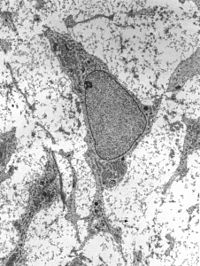
Photo from wikipedia
Mesenchymal stem cells (MSCs) are promising candidates for the development of cell-based drug delivery systems for autoimmune inflammatory diseases, such as multiple sclerosis (MS). Here, we investigated the effect of… Click to show full abstract
Mesenchymal stem cells (MSCs) are promising candidates for the development of cell-based drug delivery systems for autoimmune inflammatory diseases, such as multiple sclerosis (MS). Here, we investigated the effect of Ro-31-8425, an ATP-competitive kinase inhibitor, on the therapeutic properties of MSCs. Upon a simple pretreatment procedure, MSCs spontaneously took up and then gradually released significant amounts of Ro-31-8425. Ro-31-8425 (free or released by MSCs) suppressed the proliferation of CD4+ T cells in vitro following polyclonal and antigen-specific stimulation. Systemic administration of Ro-31-8425-loaded MSCs ameliorated the clinical course of experimental autoimmune encephalomyelitis (EAE), a murine model of MS, displaying a stronger suppressive effect on EAE than control MSCs or free Ro-31-8425. Ro-31-8425-MSC administration resulted in sustained levels of Ro-31-8425 in the serum of EAE mice, modulating immune cell trafficking and the autoimmune response during EAE. Collectively, these results identify MSC-based drug delivery as a potential therapeutic strategy for the treatment of autoimmune diseases. KEY MESSAGES: MSCs can spontaneously take up the ATP-competitive kinase inhibitor Ro-31-8425. Ro-31-8425-loaded MSCs gradually release Ro-31-8425 and exhibit sustained suppression of T cells. Ro-31-8425-loaded MSCs have more sustained serum levels of Ro-31-8425 than free Ro-31-8425. Ro-31-8425-loaded MSCs are more effective than MSCs and free Ro-31-8425 for EAE therapy.
Journal Title: Journal of molecular medicine
Year Published: 2021
Link to full text (if available)
Share on Social Media: Sign Up to like & get
recommendations!